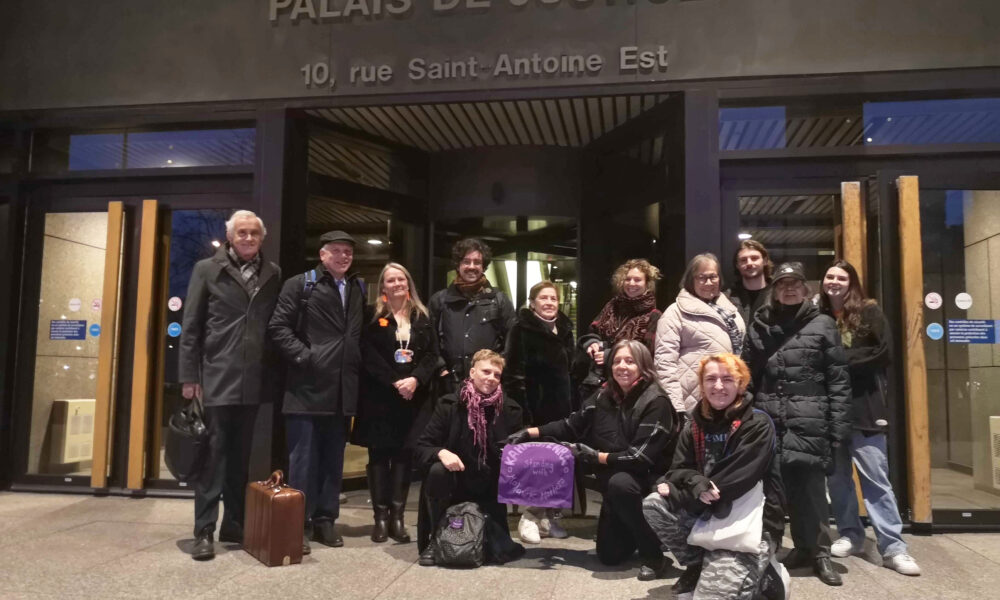The Kanien’kehá:ka Kahnistensera (Mohawk Mothers) appeared at the Montreal Courthouse for a five-hour case management hearing on Dec. 1. The hearing came as part of the Mother’s ongoing investigation into McGill’s New Vic Project site, where they fear that there may be unmarked Indigenous graves. The Mothers argued that the defendants—including McGill, the McGill University Health Centre (MUHC), the Société québécoise des infrastructures (SQI), the Royal Victoria Hospital (RVH), the Integrated University Health and Social Services Centres (CIUSSS), the City of Montreal, and the Attorney General of Canada—were refusing to abide by the settlement agreement’s mandate to provide the Mothers with all archives and medical records related to the former RVH.
Mohawk Mother Kahentinetha was the first to speak before Justice Gregory Moore. She reminded the court that under articles two, three, and four of the settlement agreement, McGill, MUHC, and the Attorney General of Canada are bound to provide expedited access to their archives and records. She alleged that MUHC refused to share their archival records on medical experiments on Indigenous children, which she believed to be direct evidence of denialism.
“[The archives] is where all the information is of what they did to our children, to our people. It’s all there, it’s all in the archives,” Kahentinetha said in an interview with The Tribune after the hearing.
The lawyer representing MUHC and RVH argued that MUHC has a right to patient confidentiality and that while MUHC wanted to assist in the investigation, they could not as confidentiality laws prohibited them from providing all patients’ records. The lawyers also explained that the medical records are only searchable by patient number, not by age or ethnicity, meaning that researchers could not search for Indigenous patients on the database.
Julian Falconer—the lawyer for the Office of the Independent Special Interlocutor, Kimberly Murray—asserted that the settlement agreement allows the defendants to override “confidentiality concerns” without consent from the patients. He further expressed that he felt the notion of collaboration and reconciliation between the two parties had “utterly disappeared,” with credible historians working on the case being at a standstill due to limited or no access to archives.
Falconer ended by stating that the refusal to provide full access to archives is the second breach of the settlement agreement by the defendants, the first being the defendant’s disbandment of the court-mandated expert archaeological panel, which Justice Moore ruled to reinstate on Nov. 20 after a case hearing on Oct. 27.
In an interview with The Tribune after the hearing, Falconer revealed that the Mothers were made aware that the defendants were considering appealing the court’s decision to reinstate the archaeological panel during the hearing.
“[McGill] was told that they made an agreement to be guided by a panel led by Indigenous-led best practices, and their response was to fire that panel,” Falconer said. “When a judge brought to their attention the error of their ways, their response is to appeal to that Judge. Does that sound like reconciliation to you?”
Philippe Blouin, anthropologist and associate of the Mothers, pointed out that appealing the court decision will take more financial resources from McGill and will lead the investigation away from protecting Indigenous graves.
“The money that they are going to spend on the appeal is money from the Canadian [and] Quebec public and from McGill students, that they’re going to use against using the best practices to find unmarked graves on those lands,” Blouin said in an interview with The Tribune. “It’s going to cost them way more than abiding by the recommendation of said panel.”
McGill explained in a written statement to The Tribune, that they have chosen to appeal to obtain further clarity on how to proceed with the investigation, and that some of the legal fees will be drawn from students’ tuition.
“McGill is seeking leave to appeal the decision that Justice Moore rendered on Nov 20. to obtain some clarity on the decision and ensure there is a clear path forward with respect to the archaeological work taking place on the site,” McGill wrote. “The University’s expenditures related to legal matters draw on the University’s operating funds. That budget is built from a range of revenue sources, including tuition and government grants.”
Kahentinetha revealed that to her knowledge, since Justice Moore’s ruling to reinstate the panel, the defendants have not taken any action to contact the members of the panel to reassemble them, all while work continues on the New Vic site. McGill confirmed in a written statement to The Tribune that they have not reached out to the members of the panel since Nov. 20.
Justice Moore adjourned court without a decision, stating the date of the next hearing will be decided via email between him and the parties involved.







